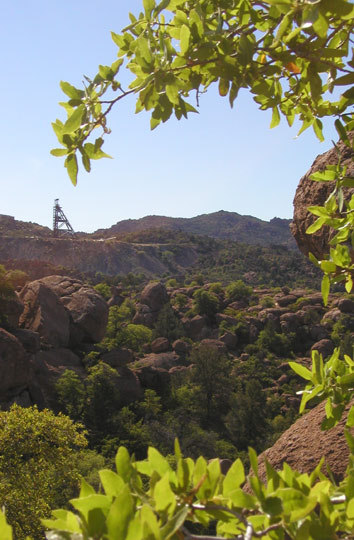
Oak Flat, Arizona, once home to the annual Phoenix Bouldering Contest, is one of many climbing areas imperiled by planned mining activity. On November 1 The Hardrock Mining and Reclamation Act of 2007 passed in the US House of Representatives; if ratified, it would reform the 1872 Mining Law, protecting, directly and indirectly, numerous climbing areas throughout the American West. [Photo] Erik Lambert
The Hardrock Mining and Reclamation Act of 2007 was passed by the US House of Representatives on November 1, ushering hope toward protecting numerous US climbing areas directly and indirectly threatened by current public-land mining laws. If ratified, the law would affect climbers by reducing mining activity in designated “special places” like roadless and Wilderness areas, and by implementing a mechanism to clean up the 500,000 abandoned mines scattered across the West.
The bill was passed overwhelmingly in the House, 244-166, with twenty-two abstaining votes. However, to become law, the bill must receive a Senate majority and survive a presidential veto, which was threatened on November 2.
Climbing areas imperiled by planned mining activity include Lost Horse Canyon, Montana, Rock Canyon, Utah, and Oak Flat, Arizona.
The 1872 Mining Law, which prioritizes hardrock mining on 270 million acres of federal public land–nearly a quarter of all acreage in the United States–affects thousands of climbing areas. This law has left a legacy of abandoned mines and pollution, especially in the West, where hardrock mining has been so pervasive that it has affected nearly everywhere climbers go. The new bill prevents new mines in sensitive areas such as designated Wildernesses, wilderness study areas, National Monuments, National Wild and Scenic River System lands, Areas of Critical Environmental Concern and lands identified as sacred sites. However, many other climbing areas not within these specific designations–such as public lands found at Indian Creek, Utah, Telluride, Colorado, and Oak Flat, Arizona–could benefit from other environmental protections in the proposed bill.
The new law also would call for a reclamation fund, in which royalties paid by mining companies would be redistributed into clean-up efforts at abandoned mines and millsites. A similar royalties-to-reclamation law currently governs the coal and oil and gas industries.
Tailings and other mining byproducts that trash wild public places are “not just abandoned garbage, but sources of pollution,” like cyanide and uranium that leech into water sources, said Jason Keith, Policy Director of the Access Fund.
One-third of the proposed reclamation fund also financially would support downtrodden “boom-to-bust” mining towns that need funding for schools, water supplies and other critical public services. This fund also may supply resources “to plan for more forward-looking economic balance so that local communities are not totally dependent on mining jobs that disappear every twenty years due to market influences,” Keith said.
The Access Fund is supporting the Hardrock Mining and Reclamation Act of 2007 by heading up an effort of Outdoor Alliance groups. They aim to design a campaign that informs climbers, kayakers, canoers, hikers and backcountry skiers about how their activities are affected by mining practices so that individuals and groups may take a more proactive role in contacting their representatives to effect change.
The Hardrock Mining and Reclamation Act of 2007 is “laying groundwork for a future effort,” Keith said. “There’s still a long road ahead.”